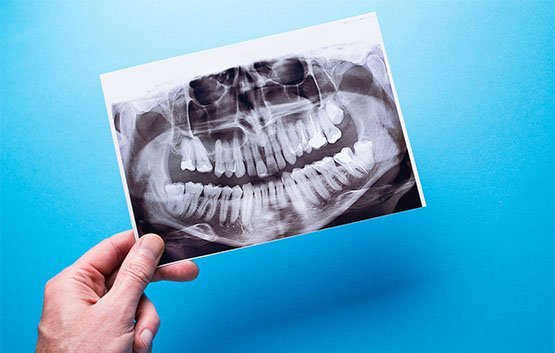
Bone grafting is a procedure usually needed when there is not enough bone available to support the placement of dental implants
Bone grafting procedures attempt to address a deficiency or defect in a patient’s jawbone. The procedure can be done by using a bone taken from the patient, or by using materials known as “bone substitutes”.
Bone volume loss can be caused by several factors, including:
Many patients prefer to use their bone for the procedure for personal reasons but may also opt to receive bone from a donor.
If the patient opts for using their bone, it is usually extracted from behind the teeth, chin, or from other areas in the body like the hip or shin.
Using your bone as a bone graft material will require having a donor and surgical site. This can cause additional healing time (and extra pain).
However, many prefer using their bone despite these effects.
A bone grafting procedure involves adding bone or bone grafting material to the affected area. Bone graft materials can be easily acquired from other areas of the jaw or from pre-packaged bone graft mineral.
When tooth is extracted, the bone around the extraction site tends to collapse inward and shrink. However, bone can be preserved and enhanced by adding bone material to the site.
The maxillary sinuses are the empty pockets behind your cheeks, above the upper back teeth. Sometimes, after an upper molar is pulled and the socket heals, a thin layer of bone will stay underneath the sinus.
If the sinus floor is too thin, bone grafting to the area may be required before implants can be placed.
When your teeth have been missing for a quite long time, the bone left may become too narrow and/or too short for dental implants.
In these cases, small and fitted bone grafts can be placed to provide adequate bone thickness and height.
Bone grafting aims to accomplish the following:
The bone grafting procedure usually only needs local anaesthesia, though oral or IV sedation can also be used for a higher state of relaxation.
Since a small incision is made into the gums to access the bone that will receive the graft material, you may feel pain in the site post-surgery.
This can usually be treated by over-the-counter medications and painkillers, and regular ice therapy.
Over the next few months, your body will replace the graft with your own bone, reversing progressive bone loss.
Bone grafting procedures performed at Elite Smiles dental clinic are safe and effective. Your treatment plan is carefully tailored just for you!
Call us on (03) 9800 2338 or book your appointment online.
We are located at 287 Stud Road in Wantirna South.
At Elite Smiles Wantirna, we are dedicated to help you and your family in maintaining your overall dental health and improve the quality of your life. Our dental clinic has been around for 32 years, serving patients from Wantirna South, Burwood, East Ringwood, Knox City, Boronia, Bayswater, Rowville, Ferntree Gully, and Scoresby.
Powered By Web Design Melbourne